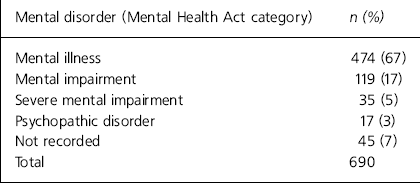In recent years, the progressive reduction in psychiatric hospital beds has meant that patients who would formerly have been detained in hospital now live in the community with varying degrees of support and supervision. A series of high profile public inquiries (Reference Ritchie, Dick and LinghamRitchie, 1994; Reference Blom-Cooper, Hally and MurphyBlom-Cooper, 1995) have fuelled concerns about risks posed, and led to renewed demands for a statutory order to enforce treatment adherence in the community. However, two community orders (Guardianship and Supervised Discharge) already exist under the Mental Health Act, although neither allow for compulsory medication.
Guardianship was embodied in the Mental Health Act 1959, following the recommendation of the Percy Commission (Campbell, 1957). The powers were defined in a wide and inexact way and subsequently under the Mental Health Act 1983, Guardianship was amended. It applied to those over 16 years of age, subject to the consent of the nearest relative, suffering from one of the four forms of mental disorder (mental illness, severe mental impairment, psychopathic disorder, mental impairment). The powers of Guardianship were defined as: (a) “The power to require the patient to reside at a place specified by the… guardian”; (b) “The power to require the patient to attend at places and times to be specified for the purpose of medical treatment, occupation, education or training”; (c) “The power to require access to the patient to be given, at any place where the patient is residing, to any registered medical practitioner, approved social worker or other person”.
It was hoped that Guardianship would provide “longterm guidance, supervision, influence and support to assist vulnerable and handicapped individuals to continue to live their lives in the community” (Reference BluglassBluglass, 1984).
Much has been written about the problems posed by Guardianship (Reference BediBedi, 1985; Reference BarryBarry, 1987), including the lack of ‘real’ power (Reference GunnGunn, 1986), practical problems with implementation and processing (Reference Wattis, Grant and TraynorWattis, 1990) and inadequate guidelines for use (Reference GrantGrant et al, 1992).
Success in the use of Guardianship has been described with the elderly (Reference Wattis, Grant and TraynorWattis, 1990), the mentally impaired (Reference CraigCraig, 1988) and a younger group of patients with functional psychosis (Reference Wattis, Grant and TraynorWattis, 1990). However, there has not been a systematic examination of the use of Guardianship nationally.
The aims of the current study were to examine a national sample and to study variation in use of Guardianship by local authorities.
The study
The Directors of social services in all 132 local authorities in England were contacted and asked to provide the following information:
-
(a) the total number of patients subject to Guardianship in the year from 1 April 1997;
-
(b) characteristics of Guardianship patients including age, Mental Health Act category and the number with severe mental illness (i.e. schizophrenia, other psychoses, major affective disorder).
Findings
One hundred and thirty authorities participated in the study (98.5%). On 1 April 1997 there were 552 Guardianship cases in those authorities. The mean number of cases per authority was 4.35 (range 0-25); 30 authorities had no cases. On 31 March 1998 there were 690 Guardianship cases with a mean for all authorities of 5.31 (range 0-27); 27 authorities had no cases. Between the two enumeration dates, there were 428 new Guardianship cases, 309 discharged cases and 103 cases taken on and discharged from Guardianship.
Two hundred and ninety-seven patients (43%) were aged under 50 and 157 (26%) were aged over 75 on 31 March 1998. The category of mental disorder is shown in Table 1.
Table 1. Mental Health Act category of Guardianship cases in England & Wales on 31 March 1998

| Mental disorder (Mental Health Act category) | n (%) |
|---|---|
| Mental illness | 474 (67) |
| Mental impairment | 119 (17) |
| Severe mental impairment | 35 (5) |
| Psychopathic disorder | 17 (3) |
| Not recorded | 45 (7) |
| Total | 690 |
The source of the order was by application in 650 (94%); the remainder were made by courts. There was a requirement to reside in 443 (64%) cases, to attend in 182 (26%), and for access in 177 (26%).
Two hundred and thirty (50%) of those in the ‘mental illness’ legal category were identified as having serious mental illness (either psychosis or major affective disorder). Only 59 cases (12%) were patients aged over 65 years with organic psychiatric disorders, including dementia and 154 had mental impairment/severe mental impairment.
Comment
The national study has identified that Guardianship is generally not widely used. There is, however, marked variation in use with some authorities being more proactive. The category of mental disorder was mental illness in two-thirds of cases, but few of these were elderly patients with organic psychiatric disorder. Indeed in a third of cases the order was used for patients with severe mental illness and a level of ‘short-term’ use was also identified.
The reasons for variation in the use of the order and further exploration of the outcome and satisfaction with the use of Guardianship is being explored in the second phase of this current study. Additionally, we are canvassing clinicians' views as to whether the powers available under the current Mental Health Act are sufficient to manage all groups of people in the community or whether a community treatment order is also required.




eLetters
No eLetters have been published for this article.